Many law firms struggle with missed calls, slow responses, and scattered client information.
These gaps in communication can frustrate clients, create confusion for staff, and even lead to lost business. Clear, secure, and consistent communication is no longer optional. It is expected.
In this article, we’ll examine seven tools designed to help law firms enhance communication with clients and staff.
From managing phone calls and text messages to keeping all case details in one place, these tools offer practical ways to strengthen client relationships and make day-to-day work easier.
Why Should You Invest in Better Law Firm Communications?
According to a OneAdvanced report, 31% of firms are considering technology to meet changing client expectations, and two-thirds already use digital communications. But why is it so? Here are possible reasons why:
Stronger Client Experience
Clients expect clear updates, easy access to information, and fast responses. If they do not understand the process, they may lose confidence in their lawyer.
Law firm staff who explain steps in plain language instead of complex legal jargon help clients feel more comfortable and in control.
For example, a client portal that shows case updates in simple terms can reduce unnecessary calls and emails. This approach saves time and creates happier clients who feel informed and valued throughout the case.
Better Use of Communication Channels
Many law firms use email, video meetings, and client portals, but not all use them in a consistent way.
Having a set of communication channels allows firms to deliver the right message at the right time. For instance, urgent updates may be better suited for a quick call, while regular progress reports can go through a secure portal.
Legal professionals who plan how to use each channel can work more efficiently and keep clients engaged. This approach also helps the firm appear organized and professional to potential clients.
Stronger Teamwork Among Law Firm Staff
Communication matters inside the firm as much as it does with clients. Clear channels between law firm staff reduce mistakes, prevent duplicated work, and speed up case progress.
Using a shared digital workspace allows lawyers, paralegals, and support staff to see the same information at the same time.
This keeps everyone on the same page and avoids delays caused by missed messages. Better teamwork not only improves productivity but also improves the service clients receive.
Building Trust With Potential Clients
Potential clients often judge a firm based on the first conversation.
If legal professionals respond quickly, explain services clearly, and avoid confusing terms, they show professionalism and respect for the client’s time. Strong communication skills can turn an inquiry into a new client relationship.
Over time, consistent and thoughtful communication builds trust, which is one of the most important factors in retaining clients and gaining referrals.
7 Law Firm Communication Tools in 2025
Law firms now rely on technology tools to keep up with client needs and improve daily work. Here are seven law firm communication tools in 2025 that can help you and other legal professionals improve client experience.
1. Talkroute for Client Communications
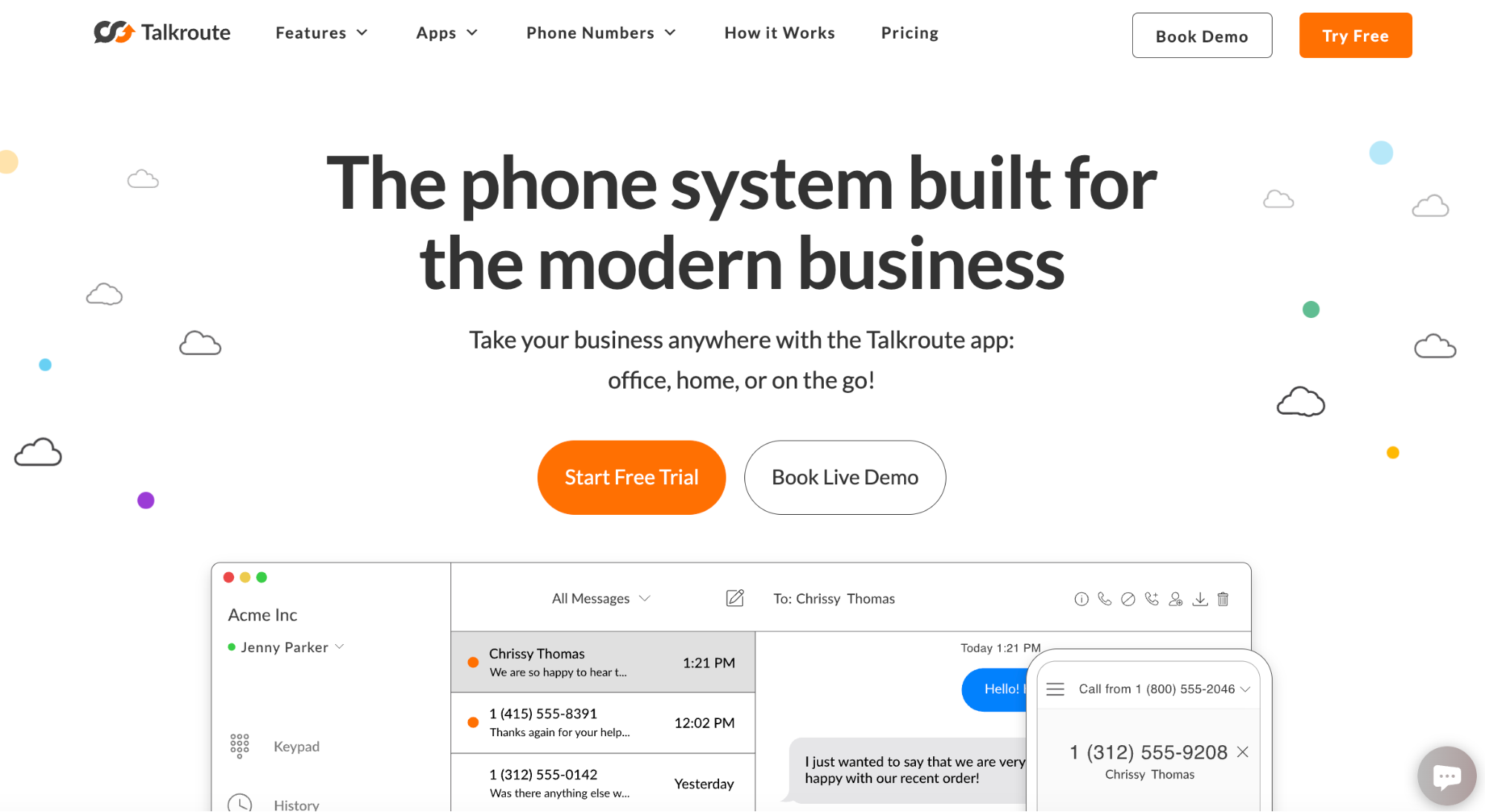
Talkroute is a cloud communications system designed to help law firms improve client communications and strengthen internal communications.
It supports phone calls, text messages, and video meetings, while also offering advanced tools like automated messages, call recording, and virtual receptionist support.
With advanced cloud phone features, Talkroute helps legal professionals build strong client relationships, save time, and keep accurate records when communicating with clients.
Key Features
- Virtual receptionist service – Talkroute partners with Smith.ai to provide AI-powered assistants and live agents who answer questions and qualify leads 24/7
- Call recording and transcription – Record phone calls, receive summaries, and connect notes with CRM or practice management tools
- Automated messages – Share important updates like office hours or directions without needing staff to answer every call
- Business text messaging – Send and receive text messages from your business number to stay connected with clients
- Internal communications – Coordinate law firm staff through shared voicemail, call routing, and message management
- Video meetings – Meet with clients or colleagues from any device with built-in screen sharing and chat
- Voicemail-to-email – Get voice messages delivered to your inbox with audio files and transcriptions for easy follow-up
- Custom call routing – Direct calls to the right lawyer or staff member based on schedules or extensions
- Extensions and directories – Give callers simple options to connect with the right department or team member
2. Clio for Document Sharing
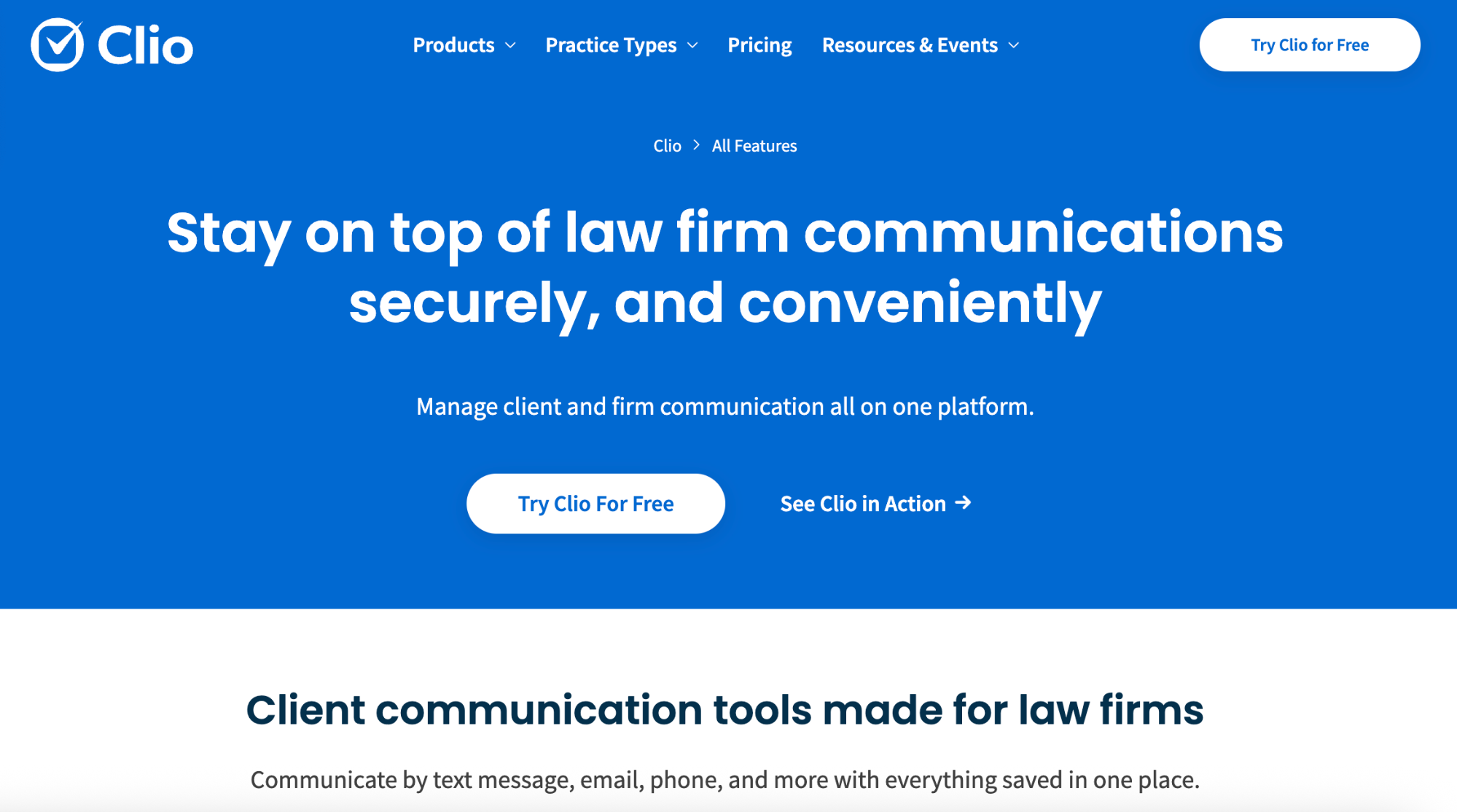
Source: clio.com
Clio provides law firms with tools to share documents securely while protecting confidential information.
It allows legal professionals to send documents, manage client information, and organize files in one place.
By linking files directly to cases, staff members can maintain complete records and improve client satisfaction.
The platform also supports automated reminders and secure portals that make it easier to share documents with clients and colleagues.
Key Features
- Secure client portal – Share documents with clients while protecting confidential information
- Case-linked documents – Attach files to cases to keep all client information organized and accessible to any staff member working on the matter
- Document organization – Store and categorize files to make it easier to locate and manage case materials
- Integration with tools – Connect with Outlook, Gmail, and Microsoft Teams to send documents and collaborate more efficiently
- Access tracking – View when clients open or download files, helping improve client satisfaction and recordkeeping
3. Lawmatics for CRM & Client Intake Process

Source: lawmatics.com
Lawmatics provides a legal customer relationship management (CRM) system designed to help firms manage client intake, organize sensitive information, and handle follow-ups automatically.
The platform supports intake forms, appointment scheduling, and automated reminders, making it easier to track both current clients and new leads.
When firms centralize communications and case details, they save time, keep consistent records, and build stronger relationships with more clients.
Key Features
- Legal CRM – Centralizes sensitive information and client details in one system for easier management
- Custom intake forms – Collect client information through forms that can be tailored for different practice areas
- Automated follow-ups – Send reminders and confirmation messages to respond quickly to potential and current clients
- Client relationship tracking – Maintains a timeline of all touchpoints, messages, and updates with more clients
- Integration with practice software – Connects with existing systems to link intake forms, billing, and case management
4. Kohezion for Client Portals

Source: kohezion.com
Kohezion is a customizable database management platform that law firms can adapt into a secure client portal.
It helps firms organize cases, documents, and client information while allowing flexibility to design workflows that fit specific needs.
The platform can support relationship management throughout the client’s journey, making it easier to manage communications and internal processes without requiring advanced technical skills.
Key Features
- Customizable dashboards – Build dashboards tailored to client data and firm workflows
- Advanced reporting – Generate analytics to track case progress and client information
- Secure file sharing – Store and share confidential documents through a secure client portal
- Third-party integrations – Connect with external applications for added functionality
- Drag-and-drop interface – Use a user-friendly design to create forms and workflows
5. Case Status for Real-Time Case Updates
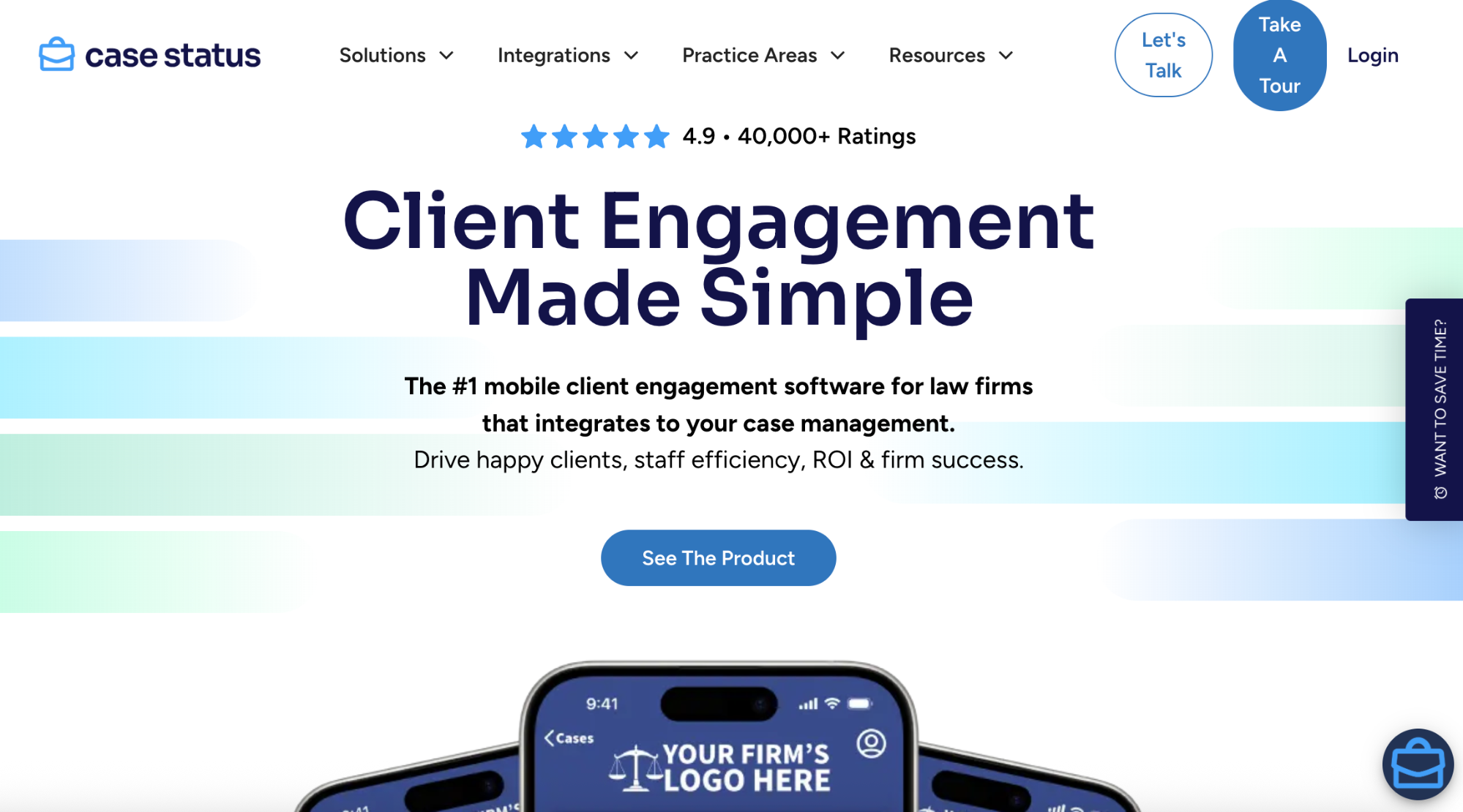
Source: casestatus.com
Case Status is a mobile client engagement platform designed to provide real-time case updates through an integrated client portal.
It connects directly to case management systems, helping firms centralize communication, reduce routine phone calls, and remind clients of key dates or appointments.
The platform also supports feedback collection, allowing firms to improve how their law firm works with both current and future clients.
Key Features
- Mobile case portal – Provides clients with a single location to view updates and documents in real time
- Automated reminders – Remind clients about meetings, deadlines, and case milestones without manual follow-ups
- Centralized communication – Organize text messages, updates, and questions directly within the platform
- Feedback collection – Gather client input to measure satisfaction and improve how the firm works with cases
- Case management integration – Connects with popular legal systems to streamline updates, tasks, and records
6. SmartAdvocate for Practice Management

Source: smartadvocate.com
SmartAdvocate is legal practice management software designed to help firms manage cases, documents, and communications in one system.
It includes built-in AI tools for summarizing files, transcribing calls, and translating content, along with features for automating workflows and improving intake processes.
The platform can also help generate more leads by improving intake tracking and follow-ups, while making it easier to share files securely and keep everyone in the firm updated.
Key Features
- AI tools – Summarize cases, transcribe audio, translate messages, and refine notes within the platform
- Workflow automation – Standardize case steps with automated procedures from intake through resolution
- Document management – Create templates, store unlimited documents, and share files securely with clients or staff
- Custom dashboards and reports – Track financial details, performance metrics, and case updates with customizable reports
- Intake management – Capture new prospects with intake forms, monitor follow-ups, and manage more leads efficiently
7. MyCase for Case Management
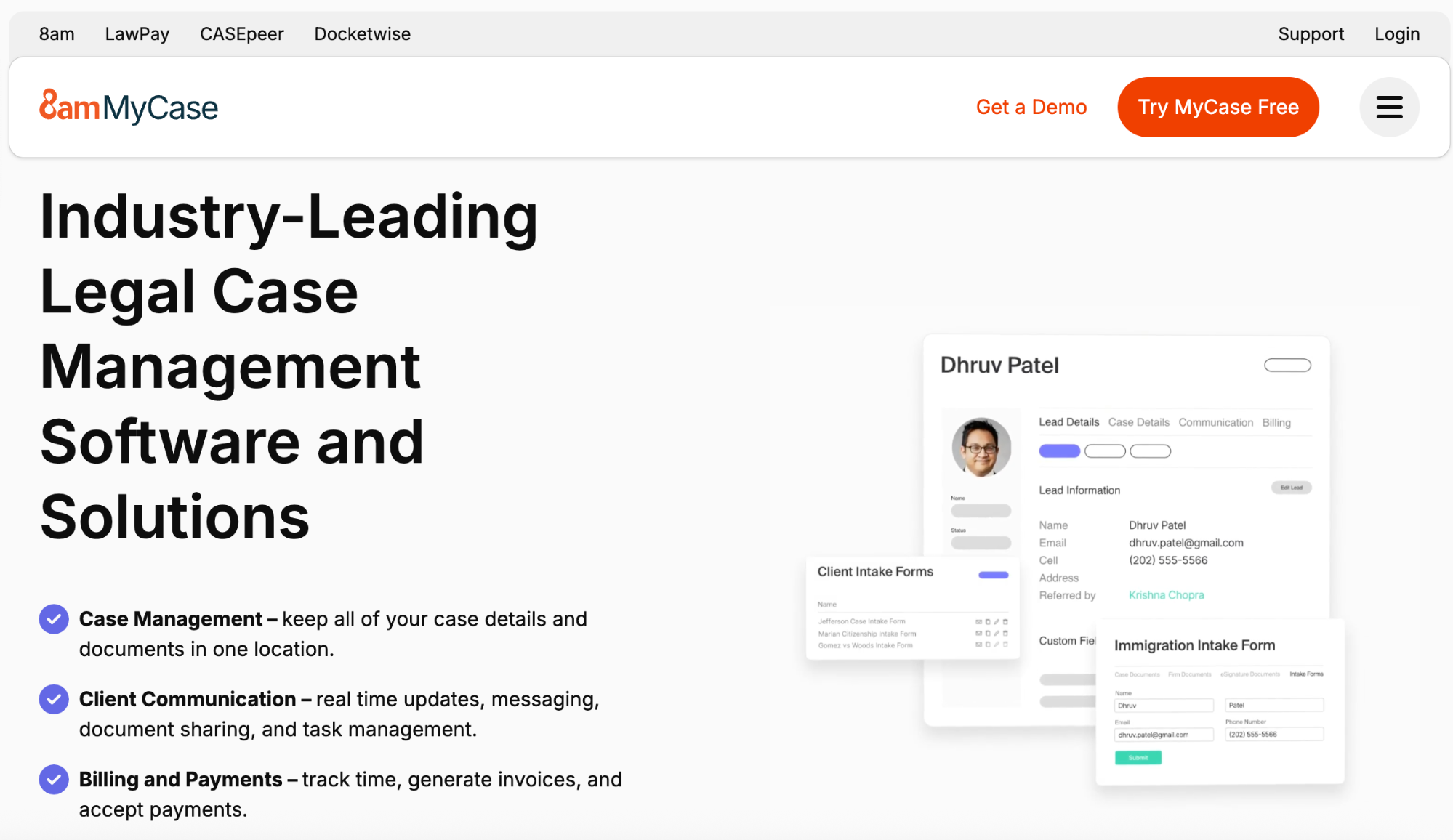
Source: mycase.com
MyCase is a legal industry case management platform that helps law firms organize client information, documents, billing, and scheduling in one system.
It includes features for lead management, allowing firms to capture new clients with intake forms and respond quickly through text or email.
The platform also supports law firm client communication with a secure client portal, built-in texting, and calendaring tools.
Key Features
- Lead and intake management – Capture new clients with customizable intake forms and track them through the signing process
- Client portal – Provide client communications securely with access to documents, updates, and shared messages
- Case management tools – Manage calendars, deadlines, and case details in a centralized system
- Billing and payments – Track time, generate invoices, and process payments in one platform
- Document management – Create, edit, and share case-related documents with staff and clients
How Law Firms Can Communicate Better With Clients
Strong communication is at the heart of every client relationship. Here are some practical tips to keep your firm and your clients on the same page.
Use Active Listening
Clients often come to you during a stressful or uncertain time.
Practicing active listening means giving them space to explain their particular situation and making sure you truly understand what they need.
Repeat important points so the client knows you are paying attention, and record those details in your case management system for accuracy.
Balance Traditional Methods With Modern Tools
Phone calls and in-person meetings remain important traditional methods of communication, but today’s clients also expect digital options.
Offering secure portals, email, and text updates makes client communication more flexible. This balance helps make client communications secure while still keeping personal interaction when it matters most.
Watch how extensions make it easy for clients to reach their lawyer directly without confusion.
Keep Clients on the Same Page
Regular updates help clients feel informed about what is happening with their case. Even if there is no major progress, a short update shows that you are still focused on their matter.
Clear communication avoids misunderstandings and makes sure both you and the client remain on the same page from start to finish.
Create a Positive Experience
Clients remember how they were treated as much as the outcome of their case.
Simple steps like sending appointment reminders, following up after meetings, and making sure updates are clear can create a positive experience.
This not only builds trust but also encourages more positive reviews and referrals.
Protect Confidential Information
Clients want to know that their personal and legal information is safe.
Always use tools that make client communications secure, whether sharing documents or sending case updates.
Showing that you respect their privacy strengthens confidence in your firm and demonstrates professionalism.
Recommended reading
6 Strategies for Effective Overflow Call Handling
How to Improve Collaboration in the Workplace
Simplify Client Communications With Talkroute
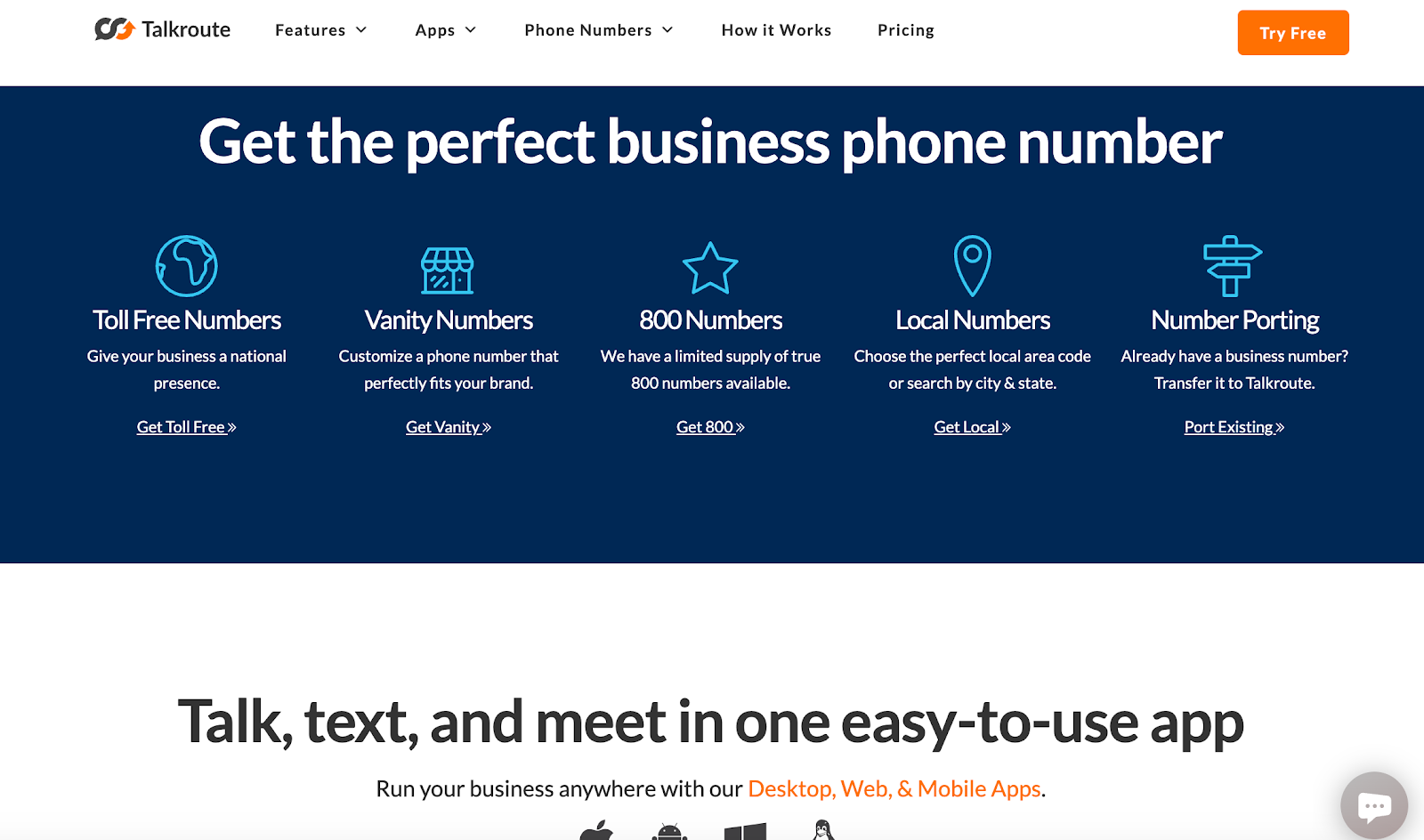
Managing client communications does not have to be complicated. Talkroute gives law firms a single system to manage phone calls, text messages, voicemail, and even video meetings.
Features like call recording, voicemail-to-email, and automated messages help make client communications secure while reducing the time staff spend on routine tasks.
With a virtual receptionist service connected through Smith.ai, clients can reach someone at any time of day.
Calls are answered, questions are logged, and new leads are qualified without relying on staff availability.
Number extensions, directories, and customizable call routing also make it easy to direct calls to the right lawyer or staff member, keeping clients connected to the right resource.
Talkroute supports both client updates and internal communications. Shared voicemail, screen sharing during meetings, and file sharing features allow staff to coordinate more effectively.
FAQs About Law Firm Communications
What does a communications lawyer do?
A communications lawyer helps clients deal with media, broadcasting, and digital platform regulations.
They handle cases related to free speech, copyright, advertising, and telecom rules. Their role is to guide both companies and individuals on legal issues around communication.
What type of communication do lawyers use?
Lawyers use clear and precise communication when dealing with clients, courts, and colleagues.
They rely on formal letters, contracts, and legal documents, but also use tools like email, text messaging, or business communication software for everyday updates.
The goal is always to avoid confusion and keep records accurate.
How much do communications managers make at law firms?
Communications managers at law firms usually earn between $70,000 and $120,000 a year, depending on the size of the firm and their experience.
At larger firms, pay can be higher, especially if they manage complex public relations or marketing strategies.

Stephanie
Stephanie is the Marketing Director at Talkroute and has been featured in Forbes, Inc, and Entrepreneur as a leading authority on business and telecommunications.
Stephanie is also the chief editor and contributing author for the Talkroute blog helping more than 200k entrepreneurs to start, run, and grow their businesses.




